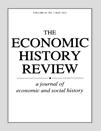
ECONOMIC HISTORY REVIEW
Scope & Guideline
Decoding History to Understand Economic Evolution.
Introduction
Aims and Scopes
- Economic Development and Industrialization:
The journal focuses on the processes of economic development and industrialization across different regions, particularly in the context of Asia, Australia, and Europe. It examines how these processes have shaped societal structures and economic policies. - Historical Trade Patterns and Economic Networks:
A core area of interest is the analysis of historical trade patterns and the evolution of economic networks. This includes studies on the impact of trade on local economies and the role of global connections in shaping economic outcomes. - Socioeconomic Structures and Inequality:
The journal investigates the socioeconomic structures that have caused inequality throughout history, including labor markets, class dynamics, and demographic changes, providing insights into how these issues persist today. - Impact of Colonialism and Globalization:
Research often delves into the consequences of colonialism and globalization, exploring how these forces have influenced economic practices and policies in various regions, particularly in relation to developing countries. - Methodological Approaches in Economic History:
It encourages diverse methodological approaches, including quantitative analyses, qualitative case studies, and interdisciplinary perspectives, enriching the field of economic history with varied research methods.
Trending and Emerging
- Gender and Economic History:
Recent publications highlight the intersection of gender and economic history, examining how gender dynamics have influenced economic development and labor markets throughout history. This trend is critical for understanding the role of women and marginalized groups in historical economies. - Environmental and Agricultural Economic History:
There is an increasing focus on environmental factors and agricultural practices in economic history, highlighting how climate and ecological changes have impacted economic systems and development trajectories. - Migration and Mobility Studies:
Research on migration patterns, including emigration and forced displacement, has gained prominence. This theme is significant as it explores the economic implications of migration and the historical context of population movements. - Economic Impact of Colonialism:
A growing number of studies are investigating the long-term economic impacts of colonialism, including how colonial policies have shaped contemporary economic structures in formerly colonized nations. - Digital Humanities in Economic History:
The integration of digital tools and methodologies into economic history research is emerging as a notable trend, allowing for enhanced data analysis and the visualization of historical economic phenomena.
Declining or Waning
- Traditional Economic Theories:
There has been a noticeable decline in papers focused solely on traditional economic theories without contextual historical analysis. Scholars seem to be moving towards more integrative approaches that consider social, political, and cultural factors alongside economic theories. - Overemphasis on Western Economies:
Research specifically centered on Western economies, particularly pre-20th century, appears to be waning. There is a growing emphasis on non-Western economies and comparative studies that reflect a more global perspective. - Narrow Case Studies:
The trend of publishing narrow case studies focusing on specific events or localized economies is decreasing. Instead, scholars are favoring broader analyses that connect local histories to global economic trends.
Similar Journals

Estudios de Historia Novohispana
Diving Deep into the Colonial Chronicles of MexicoEstudios de Historia Novohispana is a prestigious open-access journal published by the Universidad Nacional Autónoma de México (UNAM), specifically through its Institute of Historical Research. Focusing on the rich tapestry of New Hispanic history, the journal serves as a vital platform for researchers, professionals, and students to disseminate innovative studies and critical analyses related to this unique historical period. Boasting an impressive Scopus ranking that places it in the 58th percentile within the Arts and Humanities category, the journal contributes significantly to the academic discourse surrounding history. Since its transition to open access in 2007, it has increased accessibility, encouraging broader engagement with historical scholarship. With a commitment to advancing research from 2019 to 2024 and beyond, Estudios de Historia Novohispana is dedicated to fostering a deeper understanding of Mexico's colonial past and its implications for contemporary society. Researchers can take advantage of its wide-reaching audience, making it an essential resource for those dedicated to the exploration of New Hispanic history.

BUSINESS HISTORY REVIEW
Illuminating Historical Insights for Contemporary Challenges.Business History Review is a prestigious academic journal published by Cambridge University Press that has been at the forefront of historical scholarship in business since its inception in 1926. With a strong emphasis on interdisciplinary research, it covers a wide range of topics within the field of business history, making it an essential resource for researchers, professionals, and students interested in understanding the historical contexts that shape contemporary business practices. The journal is recognized for its high scholarly impact, featuring a Q1 ranking in History and Q2 rankings in both Business and International Management and Business, Management and Accounting (miscellaneous) categories. Although not an open-access publication, it offers significant insights and groundbreaking research for its audience. With a commitment to promoting a deeper understanding of business's past, Business History Review remains a vital publication for those seeking to connect historical analysis with modern business challenges.
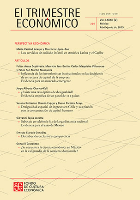
TRIMESTRE ECONOMICO
Bridging Historical Perspectives with Modern Economic Insights.TRIMESTRE ECONOMICO, published by FONDO CULTURA ECONOMICA, is a prominent open access journal in the field of Economics and Econometrics based in Mexico. Since its inception in 1979, this journal has served as a critical platform for disseminating scholarly research and theoretical advancements within economic sciences, addressing both contemporary issues and historical perspectives. With an impact factor that ranks it within the Q3 category among 716 journals in its field, TRIMESTRE ECONOMICO continues to contribute significantly to the academic community, providing readers with insights into economic modeling, policy analysis, and empirical research. The journal has embraced open access since 2011, fostering a broad reach and encouraging innovation and collaboration among researchers, professionals, and students. It is essential reading for those seeking to deepen their understanding of economic trends and theories, making valuable contributions to both local and global discussions.
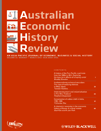
AUSTRALIAN ECONOMIC HISTORY REVIEW
Uncovering Historical Trends, Informing Today’s Economics.The Australian Economic History Review, published by Wiley, is a premier journal dedicated to advancing the field of economic history through rigorous research and insightful analyses. With an ISSN of 0004-8992 and an E-ISSN of 1467-8446, this journal has established itself as a critical resource for scholars and practitioners alike, with a notable Scopus ranking that places it in the 85th percentile among History journals and provides a complementary perspective in Economics and Econometrics fields. Since its inception in 1974, it has provided a platform for innovative research, fostering discussions that span Australian economic developments and their global contexts. Although it offers limited Open Access options, the journal remains a vital source of information for those seeking to understand the intricate dynamics of economic processes through historical lenses. Researchers, professionals, and students are encouraged to engage with the rich content that contributes significantly to both academic scholarship and practical implications in economic historiography.

Midland History
Charting the Course of Midlands' Historical LegacyMidland History is a distinguished academic journal, grounded in the rich historical tapestry of the United Kingdom, and published by Routledge Journals, Taylor & Francis Ltd. With an ISSN of 0047-729X and an E-ISSN of 1756-381X, this journal serves as a vital platform for scholarly discourse on various aspects of regional and national history. Although categorized in the Q4 quartile for History in 2023, Midland History is committed to bridging gaps in current historical research and provides a unique opportunity for researchers, professionals, and students to engage with new findings and interpretations. The journal has been published in converged issues spanning from 1971 to 2024, indicating a long-standing commitment to scholarly excellence. Contributions often focus on the social, cultural, and political narratives that shaped the Midlands, making it an important resource for those interested in the intersections of historical practice and contemporary thought. While not currently an open-access journal, Midland History’s contributions are pivotal for fostering a deeper understanding of history within academic circles.
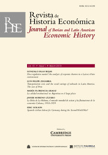
Revista de Historia Economica
Connecting Historical Contexts with Economic RealitiesRevista de Historia Economica, published by Cambridge University Press, is a distinguished peer-reviewed journal that serves as a vital platform for interdisciplinary scholarship in the fields of Economics and History. With an impressive impact factor and ranked within the top quartiles in its respective categories—Q2 in Economics and Econometrics and Q1 in History—this journal stands as a significant resource for researchers and professionals seeking to explore the intricate relationships between economic phenomena and historical contexts. Covering a timeline of research from 1983 to 2024, it addresses both contemporary and historical economic issues, making it an essential read for students and scholars alike. The journal, although not Open Access, maintains rigorous standards of academic excellence and inclusivity, aiming to enhance the understanding of economic history through comprehensive analyses and innovative perspectives. Its esteemed editorial board and qualitative publications ensure that Revista de Historia Economica is at the forefront of economic historiography, attracting a wide readership base in the United Kingdom and beyond.

Voprosy Ekonomiki
Empowering Scholars with Rigorous Economic AnalysisVoprosy Ekonomiki, a well-established journal published by VOPROSY EKONOMIKI, NP, serves as a vital platform for dissemination of economic research and discourse in the Russian Federation and beyond. With a rich publication history dating back to 1978, the journal covers a broad spectrum of topics within the fields of Business, Economics, Finance, and History, reflecting its interdisciplinary nature. Notably, it holds a Q3 classification in major categories such as Business and International Management, Economics and Econometrics, and Finance, indicating its reputable standing in academic circles. While Voprosy Ekonomiki is not an open-access publication, it provides extensive insights that are instrumental to researchers, professionals, and students looking to enhance their understanding of economic theory and practice. With its inclusion in Scopus and commendable rankings in various disciplines, this journal proves to be an essential resource for those engaged in the dynamic study of economics.

Asia-Pacific Economic History Review
Charting New Territories in Asia-Pacific Economic ScholarshipAsia-Pacific Economic History Review is a distinguished journal published by WILEY, focusing on the rich and dynamic intersection of economic and historical perspectives within the Asia-Pacific region. With the ISSN 2832-157X, this peer-reviewed journal stands out for its commitment to open access, ensuring that groundbreaking research is readily available to academics and practitioners alike. As a newly established platform from 2023 to 2024, it has rapidly garnered attention, earning a Q1 classification in History and Q3 in Economics and Econometrics for 2023, reflecting its dual significance in both fields. The journal's ranking within the Scopus database showcases its rising impact, particularly within the top percentile for Arts and Humanities in History. Scholars are encouraged to contribute to this high-quality, interdisciplinary forum that explores the economic histories of the Asia-Pacific region, providing valuable insights and fostering discourse among researchers, professionals, and students passionate about this vital area of study.
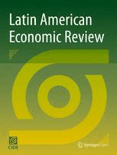
Latin American Economic Review
Advancing Economic Insights in Latin AmericaLatin American Economic Review, published by CENTRO INVESTIGACION & DOCENCIA ECONOMICAS-CIDE, is a pioneering open-access journal that has been contributing to the field of economics since its establishment in 2014. With a focus on the diverse economic landscapes of Latin America, it aims to foster a rich dialogue among researchers, policymakers, and practitioners about pressing economic issues and innovative solutions. The journal, which holds an ISSN of 2198-3526 and an E-ISSN of 2196-436X, provides an accessible platform for the dissemination of high-quality research, reflecting a commitment to advancing knowledge in the realms of economics, econometrics, and finance. Though currently positioned in the Q4 category in Economics within Scopus rankings, it continues to evolve, providing valuable insights and fostering collaboration across various disciplines. The journal's open access model enhances its reach, allowing unrestricted availability of content to researchers and practitioners worldwide. As the journal converges through its second decade (2014-2024), it remains dedicated to promoting critical analysis and discussion on economic challenges and policies that affect the region and beyond.
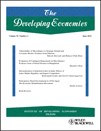
DEVELOPING ECONOMIES
Driving innovation in development economics.DEVELOPING ECONOMIES, published by Wiley, is a prestigious academic journal with a rich history dating back to 1962, dedicated to advancing knowledge in the fields of development, economics, and econometrics. The journal features a broad scope that includes empirical research, theoretical studies, and policy analyses pertinent to developing nations and their economic trajectories, making it an essential resource for researchers, professionals, and students alike. With an impactful presence reflected in its Q2 rankings in both Development and Economics & Econometrics as of 2023, and a solid position within the Scopus rankings, DEVELOPING ECONOMIES fosters a critical dialogue among scholars to address the challenges faced in global development. While it does not offer open access, its rigorous peer-review process ensures the publication of high-quality research that contributes significantly to the academic discourse. The journal is poised to continue its influence in shaping policies and understanding economic dynamics in the developing world through to 2024 and beyond.